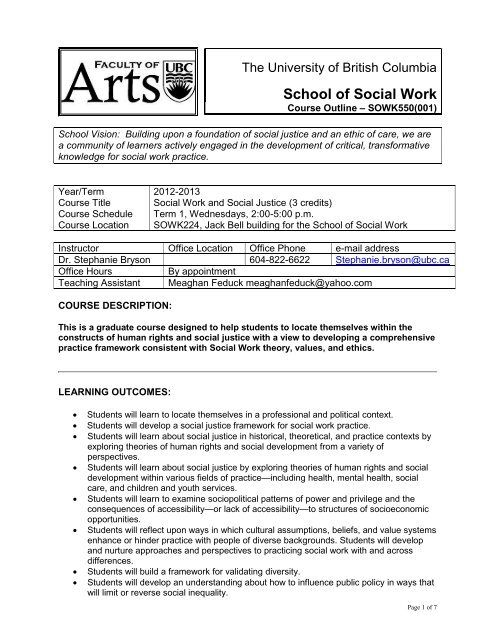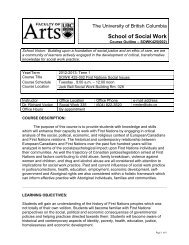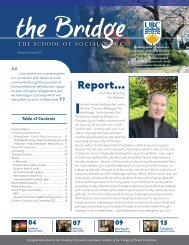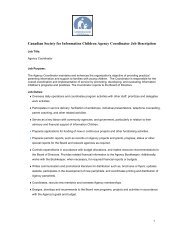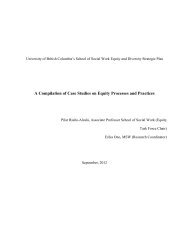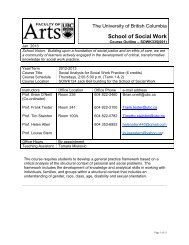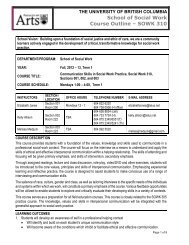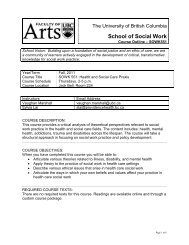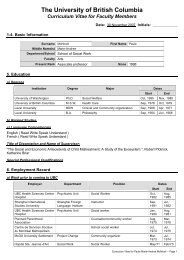Course Outline Format - School of Social Work - University of British ...
Course Outline Format - School of Social Work - University of British ...
Course Outline Format - School of Social Work - University of British ...
You also want an ePaper? Increase the reach of your titles
YUMPU automatically turns print PDFs into web optimized ePapers that Google loves.
The <strong>University</strong> <strong>of</strong> <strong>British</strong> Columbia<br />
<strong>School</strong> <strong>of</strong> <strong>Social</strong> <strong>Work</strong><br />
<strong>Course</strong> <strong>Outline</strong> – SOWK550(001)<br />
<strong>School</strong> Vision: Building upon a foundation <strong>of</strong> social justice and an ethic <strong>of</strong> care, we are<br />
a community <strong>of</strong> learners actively engaged in the development <strong>of</strong> critical, transformative<br />
knowledge for social work practice.<br />
Year/Term 2012-2013<br />
<strong>Course</strong> Title <strong>Social</strong> <strong>Work</strong> and <strong>Social</strong> Justice (3 credits)<br />
<strong>Course</strong> Schedule Term 1, Wednesdays, 2:00-5:00 p.m.<br />
<strong>Course</strong> Location SOWK224, Jack Bell building for the <strong>School</strong> <strong>of</strong> <strong>Social</strong> <strong>Work</strong><br />
Instructor Office Location Office Phone e-mail address<br />
Dr. Stephanie Bryson 604-822-6622 Stephanie.bryson@ubc.ca<br />
Office Hours<br />
By appointment<br />
Teaching Assistant Meaghan Feduck meaghanfeduck@yahoo.com<br />
COURSE DESCRIPTION:<br />
This is a graduate course designed to help students to locate themselves within the<br />
constructs <strong>of</strong> human rights and social justice with a view to developing a comprehensive<br />
practice framework consistent with <strong>Social</strong> <strong>Work</strong> theory, values, and ethics.<br />
LEARNING OUTCOMES:<br />
<br />
<br />
<br />
<br />
<br />
<br />
<br />
<br />
Students will learn to locate themselves in a pr<strong>of</strong>essional and political context.<br />
Students will develop a social justice framework for social work practice.<br />
Students will learn about social justice in historical, theoretical, and practice contexts by<br />
exploring theories <strong>of</strong> human rights and social development from a variety <strong>of</strong><br />
perspectives.<br />
Students will learn about social justice by exploring theories <strong>of</strong> human rights and social<br />
development within various fields <strong>of</strong> practice—including health, mental health, social<br />
care, and children and youth services.<br />
Students will learn to examine sociopolitical patterns <strong>of</strong> power and privilege and the<br />
consequences <strong>of</strong> accessibility—or lack <strong>of</strong> accessibility—to structures <strong>of</strong> socioeconomic<br />
opportunities.<br />
Students will reflect upon ways in which cultural assumptions, beliefs, and value systems<br />
enhance or hinder practice with people <strong>of</strong> diverse backgrounds. Students will develop<br />
and nurture approaches and perspectives to practicing social work with and across<br />
differences.<br />
Students will build a framework for validating diversity.<br />
Students will develop an understanding about how to influence public policy in ways that<br />
will limit or reverse social inequality.<br />
Page 1 <strong>of</strong> 7
SOWK550 (001) – 2012-2013<br />
COURSE STRUCTURE:<br />
This course will include a combination <strong>of</strong> lecture, seminar, and small group meetings. Class<br />
members are expected to attend every class, to complete required readings prior to class, and<br />
to arrive in class prepared to participate. Student participation in class discussions will be<br />
evaluated in part on the alacrity with which comments and reflections are <strong>of</strong>fered. Additionally,<br />
there is an expectation that differing opinions, analyses, and life experiences will be discussed<br />
in a respectful manner. Such an exchange contributes to the learning <strong>of</strong> all and requires the<br />
development <strong>of</strong> emotion regulation, a skill very important to the practice <strong>of</strong> social work at the<br />
master’s level.<br />
Generally, the first half <strong>of</strong> the class will consist <strong>of</strong> a presentation by the instructor. Generally, the<br />
second half <strong>of</strong> class will involve student participation in a large group activity or in small groups<br />
formed on the basis <strong>of</strong> a student’s field <strong>of</strong> practice (e.g., health, including mental health; social<br />
care; children and family). At the discretion <strong>of</strong> the pr<strong>of</strong>essor, some classes may deviate from this<br />
format.<br />
Evaluative tools are described below.<br />
<strong>Course</strong> Context and Prerequisites:<br />
This course is a mandatory first course for students in the Advanced year <strong>of</strong> the M.S.W.<br />
REQUIRED AND RECOMMENDED READING:<br />
Hankivsky, O. (2004). <strong>Social</strong> Policy and the Ethic <strong>of</strong> Care. UBC Press: Vancouver.<br />
Ife, J. (2008). Human Rights and <strong>Social</strong> <strong>Work</strong>: Towards Rights-Based Practice. Cambridge:<br />
Cambridge <strong>University</strong> Press.<br />
In addition, there are a number <strong>of</strong> journal articles. All <strong>of</strong> these articles can be found on the<br />
library website in ejournals; otherwise, hyperlinks are provided.<br />
ASSESSMENT, GRADING, EVALUATION:<br />
1. Weekly Reflective Journals (20%): Students will complete, each week, a one-page<br />
reflective journal that demonstrates integration <strong>of</strong> course material. The purpose <strong>of</strong> these<br />
journals is to allow students dialogical space in which to: respond affectively, think critically,<br />
and metabolize the main ideas <strong>of</strong> the course. Creativity is invited, and genuine engagement<br />
with ideas is expected and appreciated. At least seven journal entries should meaningfully<br />
incorporate readings. The first journal entry should respond to <strong>Social</strong> <strong>Work</strong> Orientation,<br />
which will be attended by all students in the course.<br />
2. Bi-Weekly Group Discussions (10%): In Week 3, students will form small groups based on<br />
chosen fields <strong>of</strong> practice. On assigned days, group members will choose an article to<br />
discuss with their respective small group examining a social justice issue within the group’s<br />
chosen field <strong>of</strong> practice. The course TA will visit groups on a rolling basis and provide<br />
discussion facilitation and support, as needed. The instructor and TA can provide article<br />
Page 2 <strong>of</strong> 7
SOWK550 (001) – 2012-2013<br />
suggestions. Small groups should be used, in part, to refine early ideas and to prepare for<br />
group presentations and individual papers, discussed below.<br />
3. Group Presentations (20%): Within their groups, students will research and critically<br />
examine the literature and/or current popular debates regarding one timely social justice<br />
topic that raises questions about full inclusion and equality—economic, political, or cultural—<br />
for the social work field. Each group will have half <strong>of</strong> one class period (1-1/2 hours) to<br />
present their work to the class. Presentations should: 1) describe the issue (e.g., racial<br />
justice; aboriginal rights; rights <strong>of</strong> people with physical, intellectual, and psychiatric<br />
disabilities; rights <strong>of</strong> GLBT groups; rights <strong>of</strong> women, children, the elderly; access to health<br />
care, affordable housing, standards <strong>of</strong> living, development, etc.); and 2) suggest or enact<br />
one or more approaches to remediate the injustice within an agency setting, policymaking or<br />
legislative body, or other administrative channel. In other words, the presentations should<br />
focus on actionable steps that can be taken to restore justice in the “real” world <strong>of</strong> social<br />
work practice. Presentations, while on serious topics, can nonetheless be fun, creative, and<br />
use a variety <strong>of</strong> formats, including but not limited to Power Point/Prezi; panel discussions;<br />
role play; guest speakers; active learning techniques. The point is to engage the class in the<br />
issue and its discussion. Further guidance on group presentations will be provided in class.<br />
Using a matrix, audience class members will comment on the strengths <strong>of</strong> classmates’<br />
group presentations and provide helpful comments for incorporation into the final paper.<br />
4. Final Papers (50%): Students will submit a paper outlining an aspect <strong>of</strong> the topic chosen for<br />
the group presentation that particularly interests them. Papers should incorporate<br />
meaningful feedback received from colleagues during the group presentation and/or<br />
refinement <strong>of</strong> ideas brought about by the presentation itself. Paper limit is 2000 words. Final<br />
papers are due November 28, 2012.<br />
COURSE POLICIES [attendance, participation, academic dishonesty]:<br />
Excerpt from the UBC calendar:<br />
Regular attendance is expected <strong>of</strong> students in all their classes (including lectures, laboratories, tutorials, seminars,<br />
etc.). Students who neglect their academic work and assignments may be excluded from the final examinations.<br />
Students who are unavoidably absent because <strong>of</strong> illness or disability should report to their instructors on return to<br />
classes.<br />
The <strong>University</strong> accommodates students with disabilities who have registered with the Disability Resource Centre.<br />
The <strong>University</strong> accommodates students whose religious obligations conflict with attendance, submitting assignments,<br />
or completing scheduled tests and examinations. Please let your instructor know in advance, preferably in the first<br />
week <strong>of</strong> class, if you will require any accommodation on these grounds. Students who plan to be absent for varsity<br />
athletics, family obligations, or other similar commitments, cannot assume they will be accommodated, and should<br />
discuss their commitments with the instructor before the drop date.<br />
It is recommended that students retain a copy <strong>of</strong> all submitted assignments (in case <strong>of</strong> loss) and should also retain all<br />
their marked assignments in case they wish to apply for a Review <strong>of</strong> Assigned Standing. Students have the right to<br />
view their marked examinations with their instructor, providing they apply to do so within a month <strong>of</strong> receiving their<br />
final grades. This review is for pedagogic purposes. The examination remains the property <strong>of</strong> the university.<br />
Academic Dishonesty:<br />
Please review the UBC Calendar “Academic regulations” for the university policy on cheating, plagiarism, and other<br />
forms <strong>of</strong> academic dishonesty. Also visit www.arts.ubc.ca and go to the students’ section for useful information on<br />
avoiding plagiarism and on correct documentation.<br />
Students wishing to use any electronic devices including computers and recorders must have<br />
the permission <strong>of</strong> the instructor and must have the wireless capacity <strong>of</strong> the device turned <strong>of</strong>f.<br />
All cell phones must be turned <strong>of</strong>f.<br />
Page 3 <strong>of</strong> 7
SOWK550 (001) – 2012-2013<br />
COURSE SCHEDULE<br />
Week 1: September 5, 2012<br />
Assignment: Attend mandatory 2-day graduate student orientation to the <strong>School</strong>’s organizing<br />
theme—<strong>Social</strong> Justice—September 4 and 5, 2012.<br />
Complete a one-page reflective journal on your experience at orientation and hand in to<br />
instructor the following week.<br />
Week 2: September 12, 2012<br />
<strong>Social</strong> Justice and <strong>Social</strong> <strong>Work</strong><br />
Required Reading:<br />
Solas, J. (2008). <strong>Social</strong> work and social justice: What are we fighting for Australian Journal <strong>of</strong><br />
<strong>Social</strong> <strong>Work</strong>, 61 (2): 124-136.<br />
Ife, J. (2008). Comment on John Solas’ What are We Fighting For Australian Journal <strong>of</strong> <strong>Social</strong><br />
<strong>Work</strong>, 61 (2): 137-140.<br />
Hugman, R. (2008). <strong>Social</strong> work values: Equity or equality A response to Solas. Australian<br />
Journal <strong>of</strong> <strong>Social</strong> <strong>Work</strong>, 61 (2): 141-145.<br />
Solas, John. 2008. Is equity just enough for social work A response to those who think it is!<br />
Australian Journal <strong>of</strong> <strong>Social</strong> <strong>Work</strong>, 61(2): 146-149.<br />
Solas, J. (2008). What kind <strong>of</strong> social justice does social work seek International <strong>Social</strong> <strong>Work</strong>,<br />
(51): 813 - 822.<br />
Lundy, C. & van Wormer, K., (2007). <strong>Social</strong> and economic justice, human rights, and peace:<br />
The challenge for social work in Canada and the USA. International <strong>Social</strong> <strong>Work</strong>, 50(6): 727-<br />
739.<br />
Chhachhi, A. & Fraser, N. (2011). Reflections: Nancy Fraser interviewed by Amrita Chhachhi.<br />
Development and Change 42(1): 297–314. Available at:<br />
http://onlinelibrary.wiley.com/doi/10.1111/j.1467-7660.2011.01691.x/pdf<br />
Recommended Reading:<br />
Young, I.M. (1990). Five faces <strong>of</strong> oppression, Justice and the Politics <strong>of</strong> Difference. Princeton,<br />
NJ: Princeton <strong>University</strong> Press: 39-65. Available at:<br />
http://www.racialequitytools.org/resourcefiles/young.pdf<br />
Week 3: September 19, 2012<br />
Ethic <strong>of</strong> Care vs. Ethic <strong>of</strong> Justice<br />
Hankivsky: Chapters 1 and 2<br />
Page 4 <strong>of</strong> 7
SOWK550 (001) – 2012-2013<br />
Week 4: September 26, 2012<br />
Human Rights<br />
Ife: Chapters 1 and 2<br />
Week 5: October 3, 2012<br />
Public and Private Human Rights<br />
Ife: Chapter 3<br />
Hankivsky: Chapter 3<br />
Week 6: October 10, 2012<br />
Culture and Human Rights<br />
Ife: Chapter 4<br />
Croome, R. (2008). The principle <strong>of</strong> pre-existence, or how the Bible stole my rights, again.<br />
Alternative Law Journal, 32(2): 64-66.<br />
Peake, L. & Ray, B. (2001). Racializing the Canadian landscape: Whiteness, uneven<br />
geographies, and social justice. Canadian Geographer, 45 (1): 180-186.<br />
Skegg, A-M (2005). Human rights and social work: A western imposition or empowerment to the<br />
people International <strong>Social</strong> <strong>Work</strong>, 48(5): 667-672.<br />
Week 7: October 17, 2012<br />
Human Rights and Human Needs<br />
Ife: Chapter 5<br />
Pogge, T. (2005) Severe Poverty as a Violation <strong>of</strong> Negative Duties, Ethics and International<br />
Affairs 19 (1): 55-84.<br />
Hulchanski, J.D. (2000). People without housing: Homelessness is a human rights violation.<br />
Speaking About Rights (Canadian Human Rights Foundation Quarterly Newsletter): 16-17.<br />
Tang, S. & Browne, A. (2008): ‘Race’ matters: racialization and egalitarian discourses involving<br />
Aboriginal people in the Canadian health care context. Ethnicity & Health, 13(2): 109-127.<br />
Week 8: October 24, 2012<br />
Human Rights and Obligations<br />
Ife: Chapter 6<br />
Hankivsky: Chapters 4 & 5<br />
Page 5 <strong>of</strong> 7
SOWK550 (001) – 2012-2013<br />
Panagos, D. (2007). The plurality <strong>of</strong> meanings shouldered by the term “Aboriginality”: An<br />
analysis <strong>of</strong> the Delgamuukw Case. Canadian Journal <strong>of</strong> Political Science, 40 (3): 591-613.<br />
Week 9: October 31, 2012<br />
Ethics and Human Rights<br />
Ife: Chapters 7, 8, 9<br />
Hankivsky: Chapters 5 & 6<br />
Week 10: November 7, 2012<br />
GROUP PRESENTATIONS<br />
Week 11: November 14, 2012<br />
GROUP PRESENTATIONS<br />
Week 12: November 21, 2012<br />
GROUP PRESENTATIONS<br />
Week 13: November 28, 2012—FINAL PAPERS DUE<br />
Wrap Up: Achieving <strong>Social</strong> Justice through <strong>Social</strong> <strong>Work</strong> Practice<br />
Ife: Chapters 10, 11, 12<br />
O’Brien, M. (2010). <strong>Social</strong> justice: Alive and well (partly) in social work practice International<br />
<strong>Social</strong> <strong>Work</strong>, 54 (2): 174-190.<br />
Chu, W. C. K. Tsui, M-S and Yan, M.C. (2009). <strong>Social</strong> work as a moral and political practice.<br />
International <strong>Social</strong> <strong>Work</strong>, 52(3): 287–298<br />
George, P., Coleman, B., Barn<strong>of</strong>f, L. (2007). Beyond “providing services:” Voices <strong>of</strong> service<br />
users on structural social work practice in community-based social service agencies. Canadian<br />
<strong>Social</strong> <strong>Work</strong> Review, 24 (1): 5-22.<br />
Ferguson, I. & Lavalette, M. (2007). Dreaming a great dream: Prospects for a new, radical<br />
social work. Canadian <strong>Social</strong> <strong>Work</strong> Review, 24(1): 55-68.<br />
Page 6 <strong>of</strong> 7
SOWK550 (001) – 2012-2013<br />
ASSIGNMENTS<br />
Submitting Assignments-<br />
Students can use the drop box located by <strong>of</strong>fice 116 to submit their assignments or any correspondence to faculty,<br />
sessionals or staff. Items will be date-stamped and distributed to the appropriate mailbox throughout the day.<br />
Return <strong>of</strong> marked student assignments-<br />
Instructors coordinate the return <strong>of</strong> marked assignments. The options are as follows: a) the instructor returns the<br />
paper to students in class; b) if the paper has been submitted electronically, the instructor will mark it on-line (with<br />
track changes) and return to the student on-line; c) the instructor returns the paper to the student by snail mail (the<br />
student provides a self-stamped, addressed envelope to the instructor). Marked papers not returned by any <strong>of</strong> the<br />
options above will be held by the instructor. Marked papers will no longer be put in a box outside the instructor’s<br />
<strong>of</strong>fice or at the main <strong>of</strong>fice counter.<br />
GRADING CRITERIA:<br />
Letter<br />
Grade<br />
A+<br />
A<br />
A-<br />
B+<br />
B<br />
B-<br />
C+<br />
C<br />
C-<br />
Percent<br />
Range<br />
90-100<br />
85-89<br />
80-84<br />
76-79<br />
72-75<br />
68-71<br />
64-67<br />
60-63<br />
55-59<br />
Mid-<br />
Point<br />
95<br />
87<br />
82<br />
77.5<br />
83.5<br />
69.5<br />
65.5<br />
62.5<br />
57<br />
Represents work <strong>of</strong> exceptional quality. Content, organization and style are all<br />
at a high level. Student demonstrates excellent research and reference to<br />
literature where appropriate. Also, student uses sound critical thinking, has<br />
innovative ideas on the subject and shows personal engagement with the topic.<br />
Represents work <strong>of</strong> good quality with no major weaknesses. Writing is clear and<br />
explicit and topic coverage and comprehension is more than adequate. Shows<br />
some degree <strong>of</strong> critical thinking and personal involvement in the work. Good use<br />
<strong>of</strong> existing knowledge on the subject.<br />
Adequate and average work. Shows fair comprehension <strong>of</strong> the subject, but has<br />
some weaknesses in content, style and/or organization <strong>of</strong> the paper. Minimal<br />
critical awareness or personal involvement in the work. Adequate use <strong>of</strong><br />
literature.<br />
D 50-54 52 Minimally adequate work, barely at a passing level. Serious flaws in content,<br />
organization and/or style. Poor comprehension <strong>of</strong> the subject, and minimal<br />
involvement in the paper. Poor use <strong>of</strong> research and existing literature.<br />
F 0-49 Failing work. Inadequate for successful completion <strong>of</strong> the course or submitted<br />
beyond final date <strong>of</strong> acceptance for paper.<br />
Page 7 <strong>of</strong> 7


